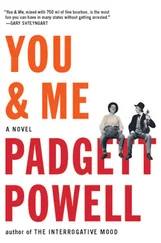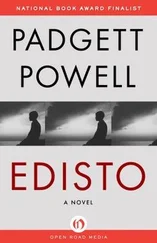“We will let you down if you’ll talk,” you tell him, but he will still just hang there, breathing a mite harder perhaps than he was moments before, his eyes very slightly widened, perhaps.
Mrs. Jenkins, yes: all that perfume, dimpled flesh, bangles bangling! Mr. Jenkins levitated, prudent, above us. If the invisible lovemaking garroter assumes your position with your wife, remain calm. An outburst on your part, even a show of agitation, can be disastrous. The garroter need not, should not, for example, see you wiggle y our legs or run in space above him. Hang motionless. He will forget you.
If you could figure out what to do with the Mr. Jenkinses of the world, both before and after you’ve garroted them to the ceiling, you’d be a lot better off, infinitely better off, infinitely.
LABOVE WAS SCARED. HARD not to be, in those circumstances. I’m scared, too. My circumstances are different.
I’ve changed my name, to Bobby Love II. You change your name when your schemes don’t work out and you move to Texas — the kook who wrote the book says so — and my father had done all but the name changing, so I added that.
One thing that will scare you is reading about your old man in a book, and scare you more if the book is not supposed to be true but is. Everything else in the book is made up, probably, but my father’s part. He put a proposition to a student and she was young and he lit out, had to — there was a fat, deranged, older-brother type he was scared of, and what the book doesn’t say is where he landed.
He landed in El Campo, Texas, schoolteaching, this time pawed the oldest, skinniest, safest girl in town, and had me, and I got rid of the Labove as fast as possible. My father was haunted by the memory of touching the Varner girl for all of five seconds the rest of his life. There was nothing subtle or serious about it, except that he was scared. After a time he was scared of fruit.
“What she was like, I need Italian to tell you,” he said once. Once, he cut up a melon into pieces so small we couldn’t pick them up on a knife as you might peas.
Our mother — mine; he called her Mother, too — was a stick. If the one he ran from was a melon, our mother was a vine, and she had a great calming effect on him. He’d kick back in a straight chair, front legs about one inch off the floor, regard her in a squint, standing there before us in a limp, unironed dress, and say, “Hadley, am I ever glad to see you.” He might say this one hour after seeing her last. She’d stand there, with a mixing bowl on her slim hip maybe, shake her head at him, and go on with her business, which was only running the house. Thus, Labove was secure.
I saw at some early age that I was not going to be wildly successful in life. Either that, or I decided somehow at some early age not to be wildly successful in life. Or both, conceivably, though neither vision nor plan will I claim to have consciously held. Let me sing, a bit out of key, rudely, oh, you boring devils, for I am scared and I am Bobby Love II.
One day a fellow student in our miserable school here handed me The Hamlet and said, “Your father’s in this book.” I looked and there was a Labove pawing a child in a classroom. Funny, I thought, and I thought to borrow the book and present it, much as the kid had to me, to my father. I gave no credence to the remote possibility that the book’s Labove was my father until my father looked at the book and I saw him react. The legs of the straight chair came down their one inch into a crisp, four-legged address, and the book was planted square on the table, and my father’s face held six inches above it in a trance. Backwards he read, then back to his name, then forwards and backwards and forwards and forwards more, then he skipped back way before and read forwards. Half an hour later: “Is this book suitable for students your age?”
“How would I know?” I said.
“You know this is a work of fiction, do you not?”
“I suppose it is. Is it?” By this I meant I hadn’t had time to tell if the book was a novel or what. I’d had enough time to tell it wasn’t Shakespeare’s Hamlet, and that my father’s name was in it, and that the named Labove was a schoolteacher like my father.
My father was out the door. When he returned, the book was not with him. I said nothing, though I was going to have to give it back to the boy who’d borrowed it from the library. It was one of those times we are all familiar with: more was happening before me than I could guess with the aid of a hundred questions answered, so the prudent course was to ask none. Preserve your innocence as is, cut your losses, maintain the dignity of the ignorant. For two weeks the boy railed for his book. Then he came up and said, “Forget it.”
Now a question: “Why?”
“Don’t know. There’s no fine. No record I checked it out. No book.”
There are many libraries in the world, even the world of El Campo, Texas, in these times, and I thereupon located the nearest Hamlet to fall outside the zone of Labove’s control. There it all is, my father and the melon-breasted child and all — if you are contemplating at any level the wildly unsuccessful life yourself — you need to know.
Four years later, when I was eighteen, I said as a joke to him, “Do you think I might change my name, legally?”
He pushed his fingers together, tip to tip, in a slow accordion motion, or if you want to see it, you can imagine one hand being a spider, albeit a five-legged spider, and the other hand being its reflection in a mirror. Now you have to wonder what a spider is doing calisthenics on a mirror for. Perhaps the spider is not doing calisthenics but is slipping. But how slowly, near meditatively, the spider is slipping, up and down, on the mirror, which mirror is held, sideways, by my father, whose hands the spider is, whose … one of the things you get wildly unsuccessful in, if you try, or do not try not to, is in your brain. Your brain can get out of hand. It can let you, or make you, paw a child, for example.
When he got through finger meditating, when the spider had pursed its mind, my father said, “Why would you want to change your name?”
“Oh,” I said, “to something snappier. Less chic. Something more American, with it.”
“I see,” he said.
“Love,” I said.
He thought for a minute and pushed back in the chair, front legs a rare full three inches off the ground. “What she was like, I need Italian to tell you. Change your name.”
This I did.
Things I am scared of: words like empyrean and sentience. Ignorance in general, but not much and not often. But sometimes, bad. All people, especially children, who have the most courage. Financial newspapers, not a word of which I get. It is possible not to be afraid of your bank balance, but once it gets very low, all you can do is be afraid of it. Same with one too high. Police, of course; all law, in fact. Law is a giant web we’ve paid someone to erect so we can watch other people, and eventually ourselves, foul in it. Circuses I am not afraid of.
Housepainting is not scary, but the likelihood of poor surface preparation is very high and therefore frightening, and housepainting is therefore also. All things which someone other than yourself must be entrusted to do are frightening, and all things which you alone must do are terrifying. Getting up early in the morning.
Fishing, though, is not frightening. However: if it’s any good, it’s expensive, and if it’s not, it’s dumb.
Eleemosynary. Litigation. Lack of litigation.
Читать дальше












